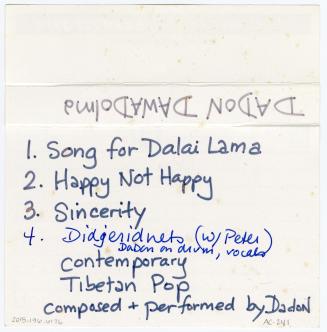Žabe i Babe Performance
Datec. 1997
Mediumreformatted digital file from audio cassette
DimensionsDuration: 32 Minutes, 4 Seconds
ClassificationsInformation Artifacts
Credit LineConnecticut Cultural Heritage Arts Program collections
CopyrightIn Copyright
Object number2015.196.673a-c
DescriptionAudio cassette demo tape of Žabe i Babe performing traditional and contemporary Bosnian music at Wesleyan University.
NotesBiographical Note: Žabe i Babe, meaning literally "frogs and grandmothers," the name of this performance ensemble is an expression similar to "apples and oranges," referring to things dissimilar in character. Formed in 1991, by Mirjana Lausevic, the group performed all over the Northeast, at Balkan music events, clubs, schools, and universities including Yale and Wesleyan. They were featured at the first International Festival of Arts and Ideas in New Haven in 1997, and produced the CD “Drumovi” that same year. As a Bosnian woman, Mirjana wanted Žabe i Babe to counteract the usual media portrayal of her country as consumed by war and hatred. She believed that music humanizes people, showing their heritage, their history, their humor, sadness, and idiosyncrasies. Bosnia is a country of many rich cultures, and Žabe i Babe honored them all. The group of then-Middletown-based professional musicians and scholars also included guitarist and vocalist Tim Eriksen, a member of the rock group Cordelia's Dad; drummer and vocalist Peter Irvine, also with Cordelia's Dad; vocalist Tristra Newyear who studied folk music in Russia; and Donna Kwon, vocalist, a performer of Korean drumming and song.The versatile members of Žabe i Babe presented a wide variety of Bosnian music. Sung as loudly as possible, traditional a capella songs from the mountains around Sarajevo are designed to carry long distances and demonstrate the singers' vocal strength. These ganga, highlander songs featuring tight harmony often heard by Western ears as dissonant, are shepherds' songs, invitations to parties, or song contests. They are generally performed outdoors in the fields, pastures, or village squares. Muslim music from Sarajevo is typically gentler, reflecting a cosmopolitan aesthetic. The group's contrasting electric second set consists of contemporary music popular in Sarajevo clubs, demonstrating Bosnia's twist on global pop music forms. All of these are living traditions sung and played in the region today.
In her native Sarajevo, Mirjana Lausevic was a Sarajevo Television commentator, led YU-Etno, a traditional Bosnian vocal ensemble, and taught at the Music Academy of Sarajevo University. For her undergraduate degree in ethnomusicology she conducted fieldwork over a period of five years in rural and urban Muslim communities in Bosnia as well as towns in Serbia and Croatia; two of her field recordings appear on the Smithsonian Folkways 1993 release "Bosnia: Echoes from an Endangered World." She received an M.A. in ethnomusicology from Wesleyan where she also pursued her doctorate. Mirjana was visiting Valentine Professor of Music at Amherst (2006-07) and associate professor at the University of Minnesota in Minneapolis. She passed away in 2007.
Additional materials exist in the CCHAP archive for this group and this community.
Cataloging Note: This project was made possible in part by the Institute of Museum and Library Services MA-245929-OMS-20.
Status
Not on view1997 February 6
c. 2000
1999 July 1













